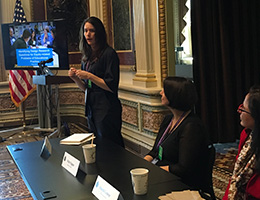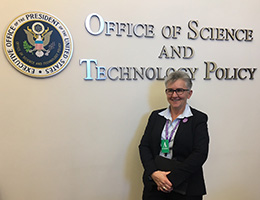EDC Contributes to National Computer Science Education Summit
EDC’s Pam Buffington, Shelley Pasnik, and Jim Stanton were invited presenters at the Expanding Computing Education Pathways (ECEP) Summit last week. Held at the White House and George Washington University, the summit marked the first time that the 17 states leading state-level, systemic computer science (CS) education reform came together to share their work and meet with researchers who can inform their efforts.
Summit-1.jpg

In the October 28 session “White House Symposium on State Implementation of CS for All,” Buffington and Pasnik presented during the panel, “Finding the Sweet Spot: What Problems of Practice Are Ripe for Knowledge Generation?” Buffington provided insights on researcher-practitioner partnerships drawn from her experience as a co-PI of the Research + Practice (R+P) Collaboratory, while Pasnik shared lessons learned from EDC’s work, including the need to support CS teachers as learners.
“We were honored to be asked to take part in the summit,” said Buffington. “It was inspiring to see the commitment, energy, and strategic thinking that state teams are bringing to their CS for All efforts, as well as their desire to strengthen their initiatives through research and practice collaborations.”
Summit-2.jpg

On October 29, Stanton served on the panel, “How State Context Impacts Reforms in CS Education” and also delivered a “state of the state” summary focused on CS education systemic reform in Massachusetts.
EDC’s participation in the summit was an important extension of its work to ensure all students can access high-quality CS learning. With over $27 million in investments from state, federal, foundation, industry, and higher education partners, EDC has initiatives underway to support teachers, build systems, and advance knowledge of effective programs, policies, and practices to close CS opportunity gaps.